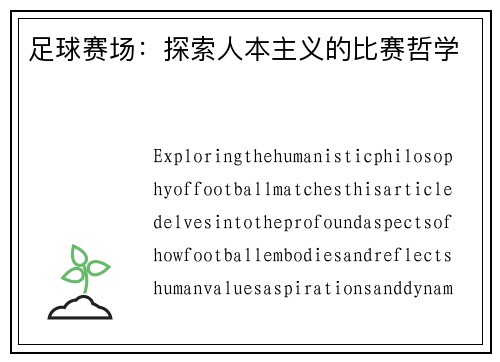足球赛场:探索人本主义的比赛哲学
Exploring the humanistic philosophy of football matches, this article delves into the profound aspects of how football embodies and reflects human values, aspirations, and dynamics.
1、Football as a Cultural Mirror
Football serves as a reflection of cultural identities and societal values, transcending borders and languages. The way teams play, celebrate, and strategize reflects broader cultural narratives.
Football matches often mirror societal tensions and aspirations. They become platforms where issues of race, class, and national pride intersect, influencing both players and spectators.
The rituals and traditions surrounding football matches highlight the human need for belonging and identity. From chants to team colors, these rituals unite diverse communities under a common passion.
2、The Ethical Dilemmas in Competition
Competitive football raises ethical questions about fairness, sportsmanship, and the pursuit of victory. Players and coaches face constant moral decisions that reflect broader societal dilemmas.
The balance between winning at all costs and playing with integrity challenges players' moral compass. Instances of cheating, diving, or controversial refereeing decisions illustrate this ethical complexity.
bsports官网
Yet, moments of fair play, respect between rivals, and acts of sportsmanship reaffirm the human capacity for compassion and integrity within the competitive arena.
3、Football and Identity Formation
For players and fans alike, football plays a crucial role in identity formation. Supporting a team often becomes intertwined with personal identity, shaping values, and self-perception.
Players embody national or regional identities on the global stage, becoming cultural ambassadors. Their performances impact collective pride and social cohesion.
Fans express and negotiate their identities through football allegiances, creating communities where belonging and acceptance are affirmed through shared passion.
4、Football as a Platform for Social Change
Football has historically been a catalyst for social change, challenging injustices and advocating for equality. Players and teams leverage their platform to address issues ranging from racism to gender equality.
Through initiatives like anti-racism campaigns, charity partnerships, and grassroots programs, football institutions promote inclusivity and social responsibility.
The sport's global reach amplifies messages of solidarity and empathy, mobilizing fans worldwide to support humanitarian causes and advocate for positive change.
Summarizing the exploration of football's humanistic philosophy, it reveals how the sport mirrors cultural identities, navigates ethical dilemmas, shapes personal and collective identities, and serves as a catalyst for social progress.
In conclusion, football encapsulates the essence of human aspirations, values, and complexities, making it more than just a game but a profound reflection of society itself.
